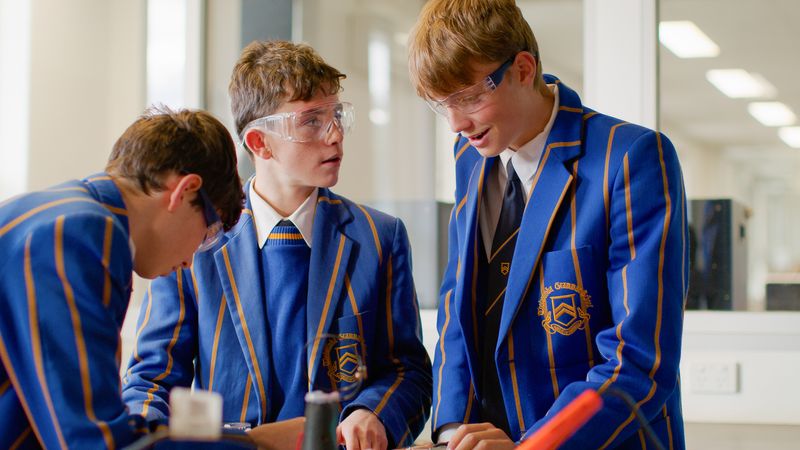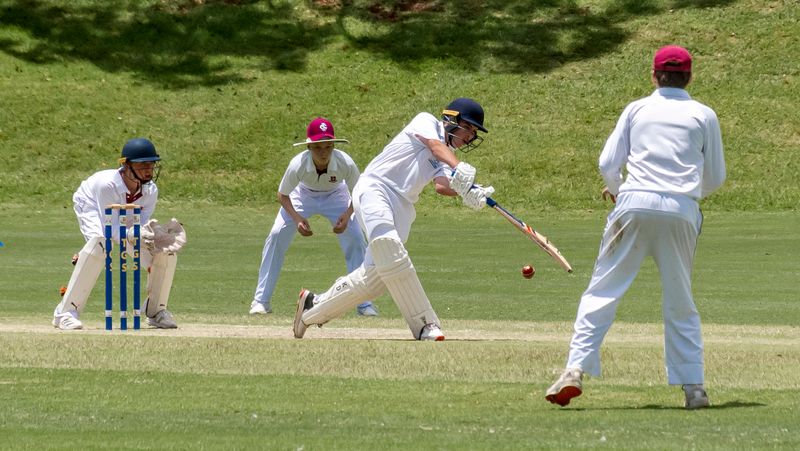“Many of the respondents spoke of controlling the controllables across six broad themes: Consistency and Routine, Using Study Tools, Environment Control, Intrinsic Motivation, Resilience and Perspective.”Mrs Crystal Hede, Director of Learning and Innovation

Giving students the opportunity to cope with disappointment has the capacity to shape their good character.
Schools are inherently hopeful and happy places. Their natural focus on growth, connectedness and preparing youth for a better future creates an optimistic atmosphere in which ambitions are born. These positive emotions and experiences lay the foundation for our expectations and while these can be highly motivating, they come with a catch: the greater our expectations, the greater the disappointments, too.
Disappointment is not a popular feeling. Rightly so, not many of us wish to feel sad, displeased or frustrated by the non-fulfilment of our hopes or expectations. However, in an academic setting, disappointments are inevitable and they can manifest in various forms. Commonly, students can find it hard to understand a concept that they see their peers comprehending and receive a lower-than-desired assessment result. Even worse, they can feel “robbed” of a grade that they believed to be rightfully theirs, not be with their preferred teacher, fall short of the required points for an academic award and face unexpected obstacles that disrupt their learning. Invariably, students will experience one or more of these things at some point in their schooling, possibly all of them, often.

For parents, it can be incredibly difficult to watch our children experience these things, especially when they result in further negative emotions such as shame or self-loathing. Sometimes, the worry we feel for our children is almost unbearable and it is natural to want to fix the problem for them. Prominent clinical psychologist, Dr Judith Locke is a leading voice on this topic. In her article, Kids need to fail. And parents need to let them; she says, “When your child is disappointed, it’s understandable you want them to feel better immediately, but taking temporary bad feelings away makes your child less capable to face inevitable trickiness in the future.” Locke goes on to say, “While I know it feels awful to watch your child be disappointed or sad, every time you help them avoid those feelings, you also sidestep them learning essential skills of resilience and a belief they will cope if life doesn’t always go their way.”

For these reasons, we will not shield students from experiencing disappointment at TGS. Doing so would be detrimental to their development and this fails to prepare them for the realities of life. Most importantly, giving students the opportunity to cope with disappointment has the capacity to shape their good character. As beautifully put by Irish politician Sir Boyle Roche, “Disappointment is the nurse of wisdom.”
I sought the wisdom of some of our older TGS students who have learned to manage their disappointments over time and even harness them for good. Specifically, I surveyed recipients of diligence awards because these recognise dedication and resilience rather than grades. All the respondents admitted to encountering setbacks and shared various versions of not letting these deter their efforts. One of the seniors said, “When faced with disappointment, I use ‘failure’ as a motivator to strive for improvement and apply the feedback I receive to make adjustments for the future.”
- Consistency and Routine: Diligent students emphasised the importance of sticking to a structured study schedule. They often study at the same time every day and for consistent durations to build a habit of regular learning.
- Using Study Tools: Many of these students use study trackers, whiteboards and diaries to reinforce learning and ensure they systematically cover all necessary material.
- Environment Control: They create and maintain separate spaces for study and relaxation to condition their minds for productive work when in the study zone. This includes removing any electronic devices from the study area.
- Intrinsic Motivation: Consistently, the diligent students spoke of a strong internal drive to improve and put in the effort required to overcome academic hurdles. This includes proactively seeking clarification or help.
- Resilience: Their responses demonstrated resilience in the form of a “bounce back” mentality. They spoke of accepting that not all decisions will be to their liking (for example, class allocations), acknowledging their negative emotions and then moving on in order to stay focused on their learning.
- Perspective: Maturely, some of the boys spoke about managing their expectations. While hopes and dreams can be powerful motivators, it’s important to balance them with realistic expectations to maintain a healthy mindset.
TGS Old Boy (2011-13) and 2024 Paris Olympic medalist, Matthew Denny recently spoke with our students, sharing some anecdotes and advice that aligned with the above sentiments. He said that one of the biggest things he learned from his career was that “Success lies on the other side of discomfort. You just need to step toward it and keep moving.” Matthew’s wise words support the notion that disappointment — a form of discomfort — is a natural and expected part of life that forms our character as we strive towards our goals and aspirations. With this in mind, our TGS boys need to keep dreaming but expect that disappointment will occur. They need to keep moving and trying and see disappointment as an opportunity for learning.
Reference
Locke, J. (2019, March). Kids need to fail. And parents need to let them. The Courier Mail. Retrieved September, 2024, from https://www.couriermail.com.au/rendezview/kids-need-to-fail-and-parents-need-to-let-them/news-story/5df007cfd72f50b4a22b03c39c127781
Latest Blog
TGS Rugby Ambassadors' Program
“As a Grammar boy, you have the Blue and Gold in your blood for life. You’ve got connections and networks because of this special bond. It’s hard to describe what it is exactly; I think it stems from the history and traditions that are passed down to each generation but it’s something you carry your entire life, you’re part of this team.” – TGS Old Boy (1960-63) John Campbell, Senior Prefect 1963, Captain 1st XV Rugby 1963. John was excited to learn in a recent edition of The Blue and Gold…
TGS Leading the Way for IT in Education
Toowoomba Grammar School is fortunate to have a strong partnership with Microsoft / School Locker. We are a Microsoft Lighthouse School, leading the way in technological advancement and deployment in Australian schools. This recognition would not be possible without two key factors: our “whole school” approach to IT, whereby the School supplies every student with the same devices, ensuring equality for all boys from Prep to Year 12.our dedicated IT team, who are based on-site to immediately…
Holiday Reading
Reading is one of those activities that, the more you do, the better you get, and with the holidays fast approaching, now is the perfect time to read that book you’ve always wanted to, finish a book you’ve started or try something new. It is important to keep reading over the holidays, so that we don’t step backward in our reading journey. As the Organisation for Economic Cooperation and Development (OECD) has found, reading for pleasure is a habit that can prove essential to performing well…
Developing Generational Change in our Men – Stand Up and Speak Out
The devastating effects of domestic and family violence (DFV) are more prominent today as this previously ‘taboo’ issue is finally being publicly recognised and addressed. Toowoomba Grammar School is proud to be leading the way in creating generational change for this sensitive issue through a variety of School initiatives and by supporting community groups associated with DFV. Our programs are aimed at developing good men of the future who will “Stand Up and Speak Out.” TGS became a White…
The Barbour Connection
They will tell tales of meeting someone on the other side of the world whom they spotted wearing a TGS cap. It led to an instant connection. Of getting their dream job by simply proudly sporting a TGS Old Boy tie at the interview. It led to an instant connection. There is no denying that Toowoomba Grammar School students share a special bond. We celebrate it with our annual Old Boys’ Sons and Grandsons photo and our Old Boys’ Generations Gathering dinner. You see it in the playground at…
“I’ll Be There for You” at Toowoomba Grammar School
“I’ll be there for you” was the theme of National Boarding Week. This statement is particularly relevant at Toowoomba Grammar School as the boarders, the dayboys and the staff, help each other in the good times and the bad. We see our school as a ‘boarding school’, not a ‘school with boarders’. We are proud to be one of the oldest and most highly regarded boys’ boarding schools in Australia, providing a home away from home for boys for almost 150 years. TGS came from very humble beginnings. The…
Helping families navigate rules, rewards and consequences for boys
Recently I was in a webinar that aimed to tackle the issues surrounding technology and its effects on students. Some members of the forum started openly criticising boys for their poor behaviour. Whilst their criticisms were not directed specifically at our boys, I was offended at their general statements. We can be too quick to criticise boys and we forget that their frontal lobes are still developing. We also forget that their brains are “wired” differently from girls and that they don’t see…
Accepting Our Past, Creating Our Future
Toowoomba Grammar School has added the new role of Indigenous Education Coordinator to the School’s offering, to further promote a culture of diversity, inclusivity, and reconciliation. Mr Scott Gale has been appointed to this ground-breaking position that aims to spread awareness and understanding of the significance of Australia’s culture and history. “That’s something that has been lacking in Australia’s education system for so long,” said Scott. “It’s an extremely significant part of our…
The Gift of Music
You can feel the pride and passion exude from Janelle Fletcher as she reflects on her thirty-year career as a Music Tutor at Toowoomba Grammar School. “It’s a long time to stay in any job,” she admitted. “But working with the boys, seeing how important it is to have music in their lives and to develop not only as musicians but as people, that’s what’s kept me here.” Janelle believes staff in an all-boys’ school have a real understanding of boys. “It’s been very positive for me to see the…